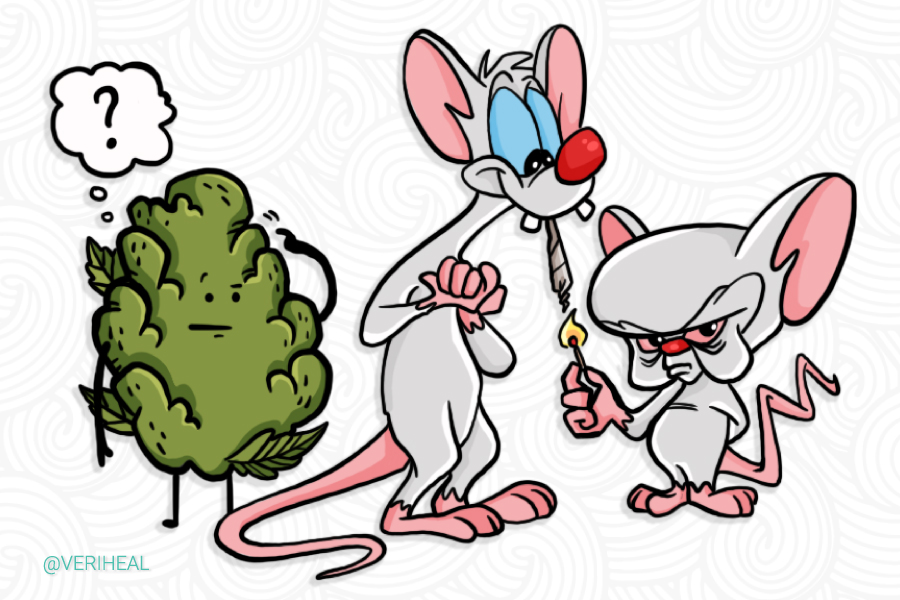Mice and rats have been playing a critical role in medical research for many years. In fact, around 95% of all lab animals are mice and rats. There are several reasons for relying on the use of mice and rats in research but recently there has been a development… Rats have developed cannabis-seeking behavior! Crazy as that may sound, the same study found that rats who are exposed to cannabis vapor respond to cannabis in the same way as humans do. Rats and mice are important for cannabis medical research break-through before human clinical trials can begin.
Why Are Animals Used For Research?
- Mice and rats are used for convenience since they are small, adapt well to new environments, are easy to keep and maintain.
- They reproduce quickly and generally have a short lifespan of two to three years which means that several generations can be observed in a relatively short time period.
- They are also inexpensive and can, therefore, be bought in large quantities from producers who breed specifically for research.
- They are also relatively mild-tempered and docile making them easy for researchers to handle.
- Most rats and mice bred for medical research are almost identical in genetics to provide more uniform results. Mice and rats used in research but are of the same purebred species.
- Genetic, biological and behavior characteristics found in mice and rats closely resemble those of humans and many human conditions and symptoms can be replicated in rodents.
- Mice and rats make for effective research animals as their anatomy, physiology, and genetics are well-known by the professionals which make it easier to make note of any changes presented in the animals.
How Did Rats Develop Cannabis-Seeking Behavior?
A recent student has been conducted where animals were enabled to self-administer cannabis vapor. This study found that rats and humans respond in the same way to cannabis vapor. This study is the first self-administration model to involve on-demand delivery of cannabis vapor of the whole plant. Three groups of rats where observed. The first group self-administered whole-plant cannabis vapor, the second group self-administered cannabidiol (CBD) vapor, and the third group self-administered air. During the observation stage, it was seen that the rats self-administering whole plant vapor was doing so much more than the other two groups. On some days, the whole plant cannabis vapor was being self-administered almost twice as often as the air and the CBD vapor groups. The most significant finding of this study was the ingestion of cannabis resulting in cannabis-seeking behavior. In other words, the rats self-administered cannabis vapor and then continued wanting to do so, especially those who were exposed to vapor from the whole cannabis plant. Is this possibly the first study that proves cannabis containing CBD and Tetrahydrocannabinol (THC) is addictive? Perhaps all it means is that rats enjoying getting high just as much as humans. Either way, the rats self-administered the whole plant vapor more, out of CHOICE.
Why You Should Get Your Medical Marijuana Card
Veriheal has satisfied millions of patients nationwide by giving them access to these benefits
- Larger purchase limits
- Peace of mind
- Enhanced legal protection
- Access to higher potency strains
- Save up to 25% on cannabis purchases
- Skip the line at the dispensary
Mice Experience Similar Effects To Humans
Mice and rats can help researchers understand the effects of cannabis on the following conditions. This is due to the fact that these human conditions can be replicated in mice and rats.
The cannabis industry is in urgent need of more information on the effects of cannabis on the developing brain, the adult brain, the senior brain, on behavior, and on many other conditions. If using rats can provide an effective model for acquiring certain results, should the professionals in research be obligated to the public to do so in order to ensure the results are as applicable to humans as possible? Since cannabis is far from lethal to humans, rats and mice should also have no worries of death since they respond to cannabis in the same manner as humans.
DISCLAIMER: Please note that this article is meant to be informative and not advocate for animal testing.
Author, Share & Comments








